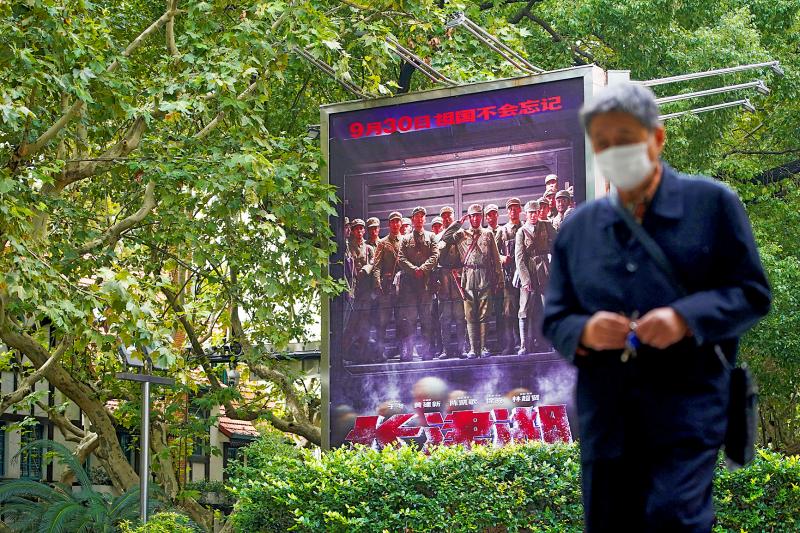A Chinese-made Korean War epic has topped the global box office, tapping a vein of rising patriotism in China and prompting moviegoers to post videos of themselves eating frozen potatoes to emulate the hardships endured by soldiers in the conflict.
The Battle at Lake Changjin (長津湖), released to coincide with China’s Oct. 1 national holiday, had grossed nearly 5 billion yuan (US$779.13 million) by Tuesday, according to data compiled by Lighthouse, a box office tracker owned by Alibaba Pictures.
That puts it ahead of current global blockbusters including the latest 007 film, No Time To Die, and Marvel’s Shang-Chi and the Legend of the Ten Rings, according to IMDb-backed movie data Web site Box Office Mojo, and makes it the biggest-grossing war film ever, overtaking Christopher Nolan’s Dunkirk, which took in US$526.9 million.

Photo: Reuters
Having premiered 20 days ago, the three-hour-movie currently accounts for half of all films being shown in Chinese cinemas, according to Lighthouse. It was made with the support of the central government’s propaganda department, according to state news agency Xinhua.
Starring Wu Jing (吳京), who directed and played the lead role in Wolf Warrior (戰狼), another nationalistic Chinese blockbuster, the film depicts Chinese soldiers battling the much-better equipped US troops during the bitter cold of the 1950-1953 war.
The conflict ended in an armistice rather than a peace treaty, leaving US-led UN forces technically still at war with North Korea.
The movie, which cost US$200 million, is the latest in a series of patriotic titles China has churned out in recent years.
The film has been embraced by official media, and a former journalist was arrested by police for suggesting on a social media platform that the soldiers frozen to death in the movie had been foolish.
One scene in the movie shows soldiers chewing frozen small potatoes between battles while their US counterparts feast on Thanksgiving turkey.
Some cinemas have distributed frozen potatoes to audiences before the movie, according to videos on Douyin, the Chinese version of TikTok, with many showing moviegoers eating them or the fried flour that was also eaten by Chinese soldiers.
A young woman in one such video cried after the first bite, saying it was impossible to eat.
“The frozen potatoes they ate give us the good life we have today,” another Douyin user said.
Peking University professor Zhang Yiwu (張頤武) said the increasing popularity of local films posed a challenge to Hollywood’s efforts to gain share in China’s movie market. “Hollywood’s movie industry produced one standard product for global audiences in the past, but they might have to learn how to cater to the Chinese market,” Zhang said.

May 18 to May 24 Pastor Yang Hsu’s (楊煦) congregation was shocked upon seeing the land he chose to build his orphanage. It was surrounded by mountains on three sides, and the only way to access it was to cross a river by foot. The soil was poor due to runoff, and large rocks strewn across the plot prevented much from growing. In addition, there was no running water or electricity. But it was all Yang could afford. He and his Indigenous Atayal wife Lin Feng-ying (林鳳英) had already been caring for 24 orphans in their home, and they were in

On May 2, Chinese Nationalist Party (KMT) Chairman Eric Chu (朱立倫), at a meeting in support of Taipei city councilors at party headquarters, compared President William Lai (賴清德) to Hitler. Chu claimed that unlike any other democracy worldwide in history, no other leader was rooting out opposing parties like Lai and the Democratic Progressive Party (DPP). That his statements are wildly inaccurate was not the point. It was a rallying cry, not a history lesson. This was intentional to provoke the international diplomatic community into a response, which was promptly provided. Both the German and Israeli offices issued statements on Facebook

Even by the standards of Ukraine’s International Legion, which comprises volunteers from over 55 countries, Han has an unusual backstory. Born in Taichung, he grew up in Costa Rica — then one of Taiwan’s diplomatic allies — where a relative worked for the embassy. After attending an American international high school in San Jose, Costa Rica’s capital, Han — who prefers to use only his given name for OPSEC (operations security) reasons — moved to the US in his teens. He attended Penn State University before returning to Taiwan to work in the semiconductor industry in Kaohsiung, where he

President William Lai (賴清德) yesterday delivered an address marking the first anniversary of his presidency. In the speech, Lai affirmed Taiwan’s global role in technology, trade and security. He announced economic and national security initiatives, and emphasized democratic values and cross-party cooperation. The following is the full text of his speech: Yesterday, outside of Beida Elementary School in New Taipei City’s Sanxia District (三峽), there was a major traffic accident that, sadly, claimed several lives and resulted in multiple injuries. The Executive Yuan immediately formed a task force, and last night I personally visited the victims in hospital. Central government agencies and the